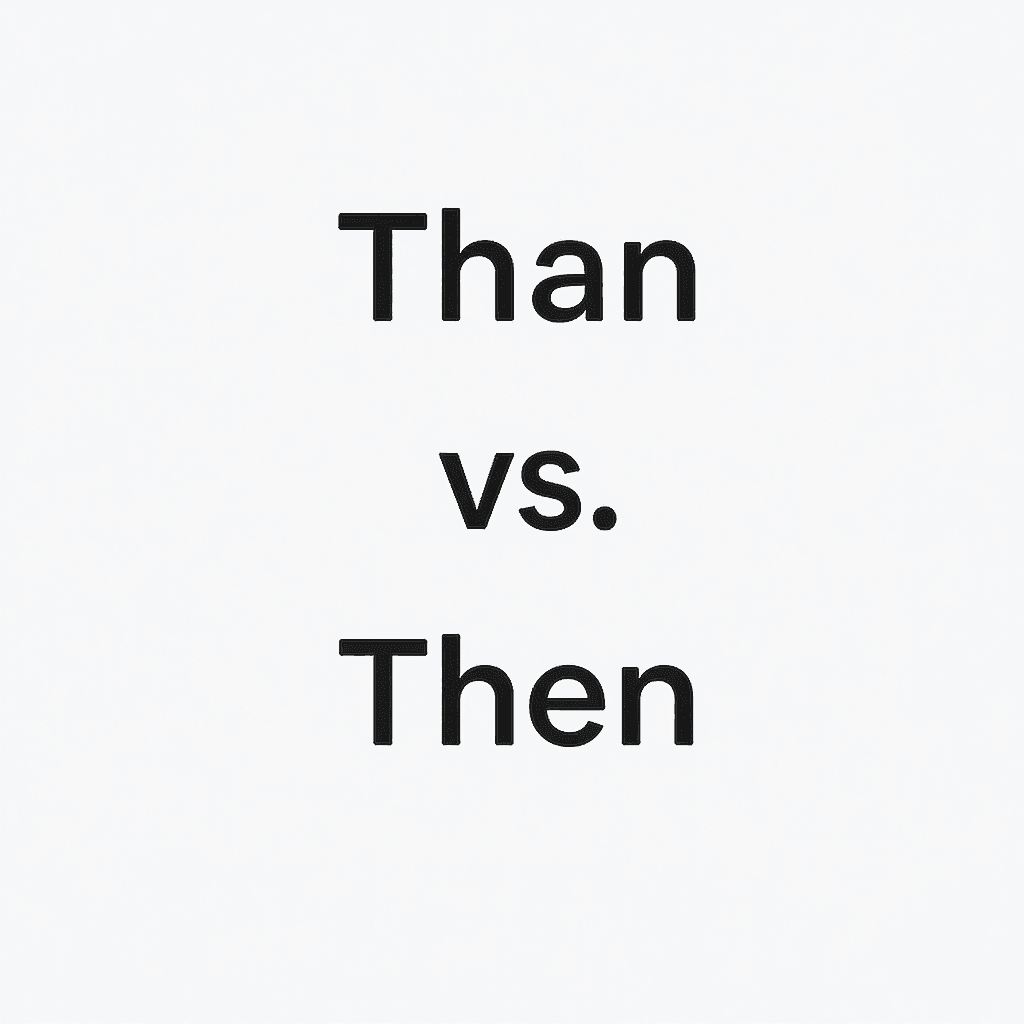“Than” vs. “Then”: What’s the Difference?
 The words than and then often confuse English learners — and even native speakers.
The words than and then often confuse English learners — and even native speakers.
They differ by just one letter, but they play very different roles in a sentence.
Let’s make it simple.
Than: Used for Comparison
Meaning
“Than” is a conjunction used to compare two things.
You’ll see it after comparative words like more, less, better, faster, or taller.
Examples of “Than” (10 total)
- She’s taller than her brother.
- This coffee is stronger than the one I had yesterday.
- I’d rather walk than drive.
- He’s more patient than I expected.
- My house is smaller than yours.
- It’s better to be safe than sorry.
- The movie was longer than I thought.
- Today feels colder than yesterday.
- You’re smarter than you think.
- I have more work than time.
🧠 Tip:
If you’re comparing, use than.
Then: Used for Time or Sequence
Meaning
“Then” is an adverb that refers to time, order, or consequence.
It often means next, after that, or at that time.
Examples of “Then” (10 total)
- I finished my homework, then went out.
- Let’s eat, then watch a movie.
- Back then, people didn’t have smartphones.
- If it rains, then we’ll stay home.
- First we’ll shop, then we’ll cook dinner.
- He was younger then than he is now.
- She studied hard, then passed the test.
- If you’re ready, then let’s go.
- I didn’t like the idea then, but I do now.
- We talked for hours, and then we fell asleep.
🧠 Tip:
If it describes time, order, or result, use then.
Quick Comparison Table
| Word | Part of Speech | Used For | Example |
|---|---|---|---|
| Than | Conjunction | Comparison | She’s taller than me. |
| Then | Adverb | Time, sequence, or result | We went home, then slept. |
Easy Way to Remember
👉 Than = Compare things
👉 Then = Talk about time
Try this trick:
If you can replace the word with next or after that, it’s then.
If you can replace it with compared to, it’s than.
Why Writers (and AI) Mix Them Up
Because they sound so similar, AI tools and fast typists often confuse them — especially when writing conversationally.
That’s why Humanizey helps refine AI-written text by catching these subtle word choice errors and keeping your writing naturally accurate.
FAQs
1. Can “then” ever be used for comparison?
No. Then always refers to time or sequence, never for comparing things.
2. Is “rather than” the only correct form?
Yes — rather than is always the correct expression (never rather then).
3. Can I start a sentence with “then”?
Yes! It’s common in storytelling: “Then he opened the door.”
4. Why do people mix them up so often?
Because they sound similar — but their meanings depend on context, not sound.
Practice: Choose the Correct Word (“Than” or “Then”)
(Answers are listed at the end.)
- She’s more confident ___ before.
- We’ll go shopping, ___ have dinner.
- I’d rather stay home ___ go out.
- It’s easier said ___ done.
- Back ___, I didn’t know you yet.
- My phone is older ___ yours.
- First I brushed my teeth, ___ went to bed.
- He’s stronger ___ he looks.
- If you miss the bus, ___ take a taxi.
- It costs less ___ it used to.
Answers
- than
- then
- than
- than
- then
- than
- then
- than
- then
- than
